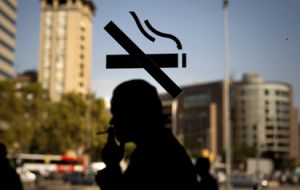MercoPress. South Atlantic News Agency
Chile to Increase Smoking Ban

Chile’s Health Minister Jaime Mañalich announced his support this week for a more strict smoking ban.
The health ministry’s initiative comes four years after a tobacco law forced restaurants to separate smoking and non-smoking areas. The proposed law would officially end of this separation, prohibiting smoking in all enclosed public spaces, playgrounds, hospital, and school grounds.
A national health survey released last week found that more than 40 percent of those over the age of 14 smoke cigarettes.
“Chile is among the five countries with the highest tobacco consumption by adults and children in the world,” said Sen. Guido Girardi, president of the Senate Health Committee, in a press release. “This goes hand in hand with [Chile’s] dramatic heart attack rates, vascular problems, cancer, and respiratory illness as a result of smoking.
Smokers in Chile smoke on average 10 cigarettes daily; in the Maule and Coyhaique Regions, however, the average smoker’s intake goes up to 16 cigarettes daily.
Studies last year showed that the tobacco law forcing the separation smoking and none smokers proved tremendously ineffective (ST, June 1).
“This (latest) project is the same as in the Spanish system, where it is prohibited to smoke in any closed public spaces,” the Health Minister told local press. “We are finished with smoking and non-smoking areas, because it is evident that the investments needed for this separation to exist in these places are impossible to implement, and anyway, it poses a growing risk for their workers.”
On Monday, the health minister met with members of the Congressional Health Committee to seek agreement on the smoking ban. Mañalich is currently reviewing proposals from the legislators to see if any changes need to be made.
Key players in the restaurant industry were unhappy with the minister’s decision. “We don’t agree at all with what they’re doing,” said Fernando de la Fuente, the president of the Chilean Gastronomy Association. “There were around 15,000 places that modified their interiors, with a total investment of US$115 million: separating the areas, buying equipment for air extraction. Now they have to make even more changes ... they shouldn’t take these laws that they are passing so lightly.”
Still, the general public consensus does not seem to be so negative.
“In fact, when it comes to restaurants, I’m glad,” student smoker Cristián told The Santiago Times. “It annoys me a little bit that I won’t be able to smoke in bars, because it’s nice to be able to have a cigarette when you’re drinking, but never mind.”
By Phil Locker - Santiago Times




Top Comments
Disclaimer & comment rules-

Read all commentsThe anti-smokers commit flagrant scientific fraud by ignoring more than 50 studies which show that human papillomaviruses cause at least 1/4 of non-small cell lung cancers. Smokers and passive smokers are more likely to have been exposed to this virus for socioeconomic reasons. And the anti-smokers' studies are all based on lifestyle questionnaires, so they're cynically DESIGNED to blame tobacco for all those extra lung cancers that are really caused by HPV. And they commit the same type of fraud with every disease they blame on tobacco.
Jan 21st, 2011 - 07:56 pm 0http://www.smokershistory.com/hpvlungc.htm
http://www.smokershistory.com/hpvlungc.htm
For the government to commit fraud to deprive us of our liberties is automatically a violation of our Constitutional rights to the equal protection of the laws, just as much as if it purposely threw innocent people in prison. And for the government to spread lies about phony smoking dangers is terrorism, no different from calling in phony bomb threats.
Commenting for this story is now closed.
If you have a Facebook account, become a fan and comment on our Facebook Page!